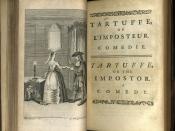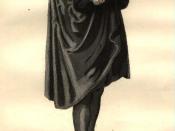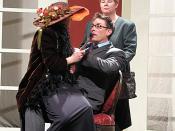In literature, deception, gullibility and power can provide motivation for the characters, and play a part in the advancement of plot or exist as a sub-theme. The works considered in our plays thus far provide prime examples of the use of deception, gullibility and power in the fore mentioned ways. This essay will focus on the act or acts of the above in Tartuffe by Moliere and Phaedra by Racine.
In Moliere's Tartuffe, the primary action of the play is focused upon the deception of Orgon as performed by Tartuffe. Tartuffe is a hypocritically pious Christian much like the televangelists of the present day. His nature is best illustrated in scene two of act three with: Hang up my hair-shirt, put my scourge in place, And pray, Laurent, for Heaven's perpetual grace.
I'm going to the prison now, to share My last few coins with the poor wretches there.
This statement, made for the benefit of Dorine, illustrates Tartuffe's hypocritical nature. Tartuffe's religious piety is much like his hair-shirt, worn only for show and does not penetrate the surface. Tartuffe uses religion to his benefit in his deception of Orgon. Orgon is so blinded by Tartuffe he will not believe even his own son when he tells him of Tartuffe's attempted seduction of Elmire. In scene six of act three, Orgon responds to Damis' accusations with: Ah, you deceitful boy, how dare you try To stain his purity with so foul a lie? Tartuffe's deception is successful until act five, scene six when, while hiding under a table, Orgon finally hears, with his own ears, Tartuffe trying to seduce his wife. It is then the ruse is over.
In Racine's Phaedra, deception is manifest in the accusations of Oenone against Hippolytus. Phaedra, the...


